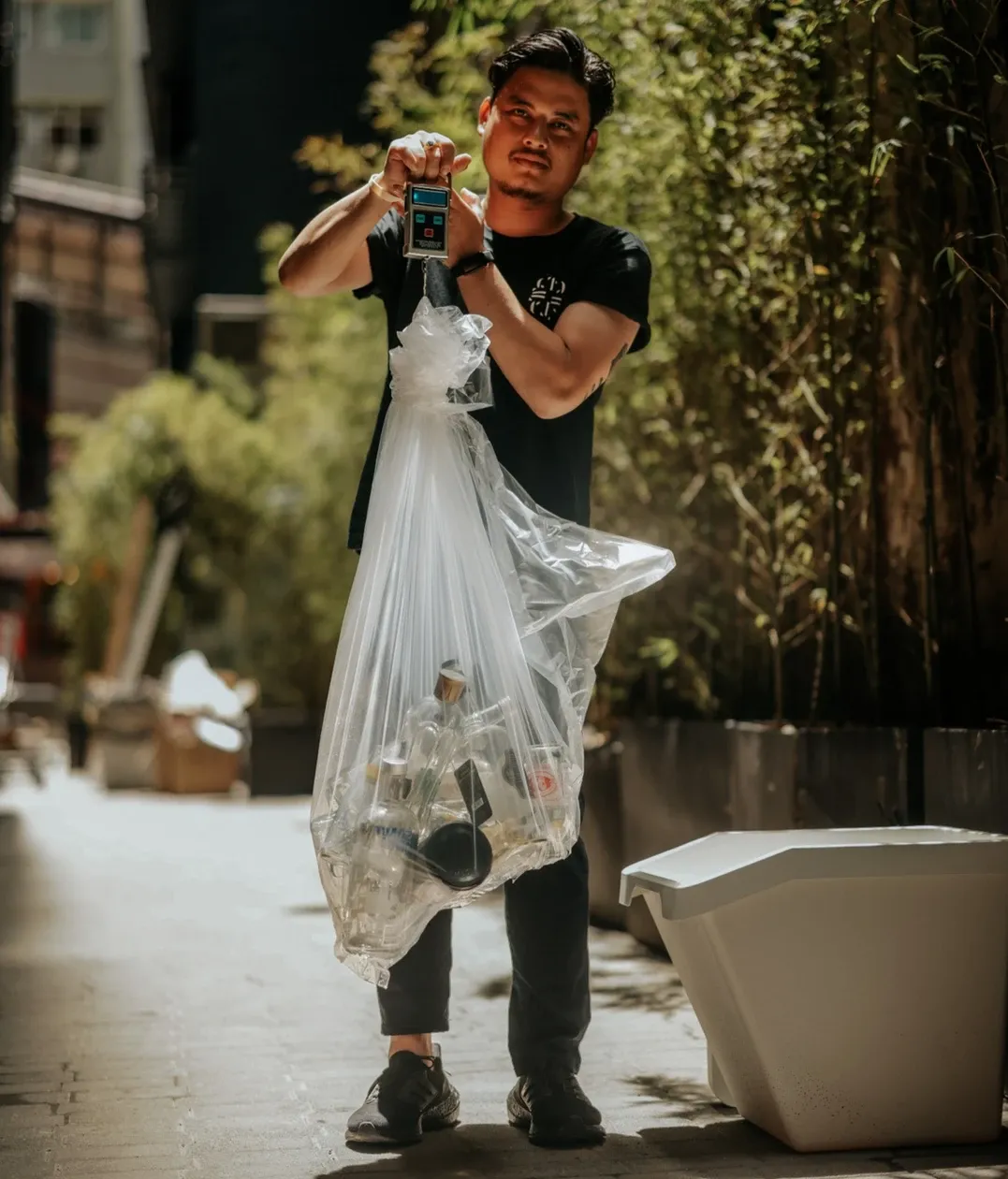How ready are Hong Kong’s F&Bs for the upcoming plastic tableware ban?
The disposable plastic tableware ban is expected to come into effect on April 22 this year and the MSW Charging Scheme is slated for August 1.

A few minutes every morning is all you need.
Stay up to date on the world's Headlines and Human Stories. It's fun, it's factual, it's fluff-free.
Imagine you’re visiting your favorite restaurant or hotel in Hong Kong sometime past August 1, 2024. By then, the disposable plastic tableware ban and MSW Charging Scheme will have come into effect. While the disposal cost of the broccoli stem you leave behind on your plate or the beverage cartons you bin in your hotel room will largely be borne by the restaurant or hotel, it’s also likely the cost will be included in your bill. As a hotel guest, you may even be instructed to separate the different types of waste you generate during your stay to comply with the MSW Charging Scheme.
Waste management and reduction: an imperative
As sustainability-minded punters, we should probably welcome the upcoming change, especially if we consider the state of waste globally and in Hong Kong. Around the world, humans collectively generate an estimated 2.24 billion tons of municipal solid waste (MSW) every year. For context, that means that if the global MSW was packed into standard shipping containers and placed end-to-end, it could wrap the Earth about 25 times.
In Hong Kong, we’re landfilling 4.06 million tonnes of MSW every year (or 11,128 tonnes per day), according to data from 2022, of which food waste accounts for about one-third and plastics 21%. With the disposable plastic tableware ban expected to come into effect on April 22 this year and the MSW Charging Scheme slated for August 1, one can’t help but wonder, how prepared are the city’s F&Bs for these well-intentioned regulations?
Zero-waste to landfill

The reality is that some businesses in the F&B and hospitality sectors are better prepared than others. Soon after the MSW charging bill was passed by the Legislative Council in August 2021, GREEN Hospitality, a charitable organization committed to transforming the F&B and hospitality industry into a catalyst for sustainability, discerned increasing concerns among its hospitality partners. Taking advantage of the business slowdown as a result of COVID-related restrictions, GREEN Hospitality launched the "Zero-waste to Landfill for the F&B Industry" project with funding from the Environment and Conservation Fund. The objective of the project was simple: to familiarize F&B outlets in Hong Kong’s SoHo area with the upcoming MSW charging scheme through training and waste monitoring. Throughout the year 2022, 20 F&Bs were able to divert a total of 22,628 kg of waste from the landfill and reap a 22% potential saving on simulated MSW charge.
This year, for the second year running, some of the city’s hospitality and F&B businesses will get the chance to rethink and repurpose food waste through the Food Waste to Good Taste project, organized by the School of Biological Science at The University of Hong Kong, supported by GREEN Hospitality and CHOMP, a food rescue app that helps F&Bs reduce unsold food surplus. Through data-driven food auditing and analyses, participating F&Bs will gain insights and practical skills on effective waste management and reduction through menu design, sourcing and storing of food ingredients, dish presentation, food waste handling and staff and guest engagement in the waste reduction initiatives. Training workshops will also be offered to F&Bs to help them understand the environmental, social and economic impacts of food waste in the F&B and hospitality industry, equipping them with the skills and knowledge to measure and track food waste reduction progress so that they can apply effective strategies and techniques to reduce food waste, considering factors such as inventory management, portion control, creative menu planning, food waste auditing, etc.
Phasing out single-use plastics
An industry leader in sustainability is the Mandarin Oriental Hotel Group, which has been in the practice of sustainability reporting since as early as 2010, making it one of the most well-prepared for the upcoming plastics ban and MSW Charging Scheme. “We are fortunate in the sense that, around 2019, even before COVID, we already pledged to eliminate single-use plastics across our operations as a group effort,” says Iris Lam, Director of Sustainability, Global Development at Mandarin Oriental Hotel Group, verified by a third party for its sustainability efforts. “Now five years out, for the second year we are reporting a 99% confidence in our single-use plastic elimination efforts. So when the government announced the disposable plastic tableware ban, we were quite calm, because we were already ahead in many ways.”
Importantly, when looking for ways to comply with the ban, Lam thinks that hotel and F&B operators should work with the government. “I see the government as quite collaborative and open to listening to questions. When I and my team looked at the list of suppliers on the government’s Green Tableware Platform, we wrote in with our questions. By the next day, we were on the phone with the government representative. This grace period really is the time to work together with others in the industry, put our questions and recommendations for the alternatives out there, so that we can help shape the list in a better form to serve everyone in the industry. Being an early adopter, we incurred some premiums for the plastic alternatives we use, like bagasse. But over the past five years, the costs of plastic alternatives have come down a lot, because there are now more manufacturers and suppliers in that space and the demand is going up. My call-to-action for manufacturers and suppliers of plastic alternatives is that if they haven’t applied to be listed on the list of suppliers, please do so because it’s a win-win.”
As the Cluster ESG Manager for Hyatt Hotels in Hong Kong and Macau, Samantha de Mello can relate. “The lack of suitable alternatives in the market is the biggest challenge for not just our hotels, but the industry as a whole,” says de Mello. The group’s hotels in Hong Kong, including Grand Hyatt Hong Kong, Hyatt Regency Hong Kong Tsim Sha Tsui, Hyatt Regency Hong Kong Sha Tin and Hyatt Centric Victoria Harbour Hong Kong, have been making changes to replace single-use disposable plastic items since 2019. For example, large-format bathroom amenities have been implemented in the guest rooms, recycling bins are placed in guest rooms and/or on each guest floor at all hotels as well as in the back-of-house areas to facilitate proper recycling, and the procurement team works closely with suppliers to replace single-use delivery materials with reusable items. “To date, our hotels have made switches to almost all our takeaway items except soup bowls, the one item that the hospitality industry has yet to find a suitable alternative for.”
There are several keys to successful sustainability initiatives, according to Iris at the Mandarin Oriental Hotel Group. “One of the things we learned from our sustainability journey so far is to think about the utility of the things we use or give out to our guests, and I would challenge everyone to think through that. For example, I personally think that cutlery should always be given only on request – we should normalize that. For hotel and F&B operators who need to justify the cost increase incurred in procuring plastic alternatives, getting rid of what they don’t actually need is one of the best ways to start.”
Waste reduction and resource circulation
Just as important is examining the intensity of waste generation. “Our hotels have worked hard over the past few months to implement new internal procedures to be compliant with the new regulations,” says de Mello. “Some examples include performing waste audits with all departments, investing in new infrastructure to establish enhanced waste separation, ensuring that our communications are ready for guest enquiries, among others. Additionally, all Hyatt hotels have implemented food waste management systems that actively measure and record food waste. The data and reports generated enable our culinary teams to work on reducing food waste in our hotels.”
Also using data to inform its food waste management and reduction efforts is PizzaExpress, which will be creating SOPs and recipes for its kitchen staff, as well as making forecasts about the amount of food ingredients needed for daily operations. “We will make sure that necessary training investments will be made to enhance the actual execution, and we will leverage our understanding of consumer profiles in order to develop recipes that will be conducive to preventing unnecessary waste on table,” says Dylan Tan, Head of Regional Food & Beverage and Training (APAC) at PizzaExpress Hong Kong.
But Hyatt’s sustainability efforts don’t just stop there. Instead of implementing sustainability initiatives for compliance’s sake, Hyatt continues to work with civil society organizations to transform waste into vital resources for people in need. “All Hyatt hotels work with local partners such as Foodink Foundation and Food Angel, where edible excess food is donated for redistribution to underprivileged families in Hong Kong,” says de Mello. “Leftover soap bars are sent to Soap Cycling Hong Kong to be reshaped into new bars that are distributed to underprivileged families.”
Collective behavioral and mindset change

The success of sustainability initiatives hinges on collective actions – through staff engagement and knowledge sharing with industry practitioners – as Lam would readily agree. “We all share a responsibility in sustainability. So find a way to reach everyone in your organization and instil a passion for sustainability in them. Help them understand that their sustainability actions matter. Invest in a knowledge base, invest in your people, invest in training and education for your people. I quite enjoy working in the space of sustainability because our sharing helps everybody. I’m glad to see that plastic alternatives are now more affordable, that there are more sustainability initiatives, because more of our industry peers are advancing sustainability. It is important to get people behind the movement, because you can’t do it alone.”
Despite the challenges that come with the disposable plastic tableware ban and MSW Charging Scheme, Lam sees them as the necessary wake-up call that we need. “It’s about time that we all take responsibility for the waste we create and think through how we can effectively reduce waste. This mindset change doesn’t only apply to commercial settings but also for individuals as well. We need to curb the behavior of creating too much waste and thinking that somebody is going to take care of our waste. Once we have achieved the right mindset and behavioral change, with supportive infrastructure in place, we can begin to drive change. Taking a longer-term perspective, I think sustainability needs to be a core subject in schools and woven into every subject matter.”
Driving mindset and behavioral change is also at work at PizzaExpress. “In as early as 2019, PizzaExpress had already kicked off a process of go-green action, which has put us in a better position now to prepare for the upcoming disposable plastic tableware ban,” says Tan. “We are learning how the requirements of the regulation will be applied to our operational functions, and thinking about the documents that may need to be prepared to familiarize our staff and guests on the new changes. The biggest challenges, I would say, are the cost impact and resources we will need to educate the team and our guests. At the end of the day, a key to success in driving sustainability initiatives at F&Bs is making sure that the actions will bring positive impact in the short term such as cost savings, which will serve as a key motivation for people to seek to drive long-term impact.”
Businesses in the F&B and hospitality industry seeking effective, low-cost solutions to waste management and reduction can find practical advice and inspiration from the toolkits, case studies and research reports here.




Comments ()